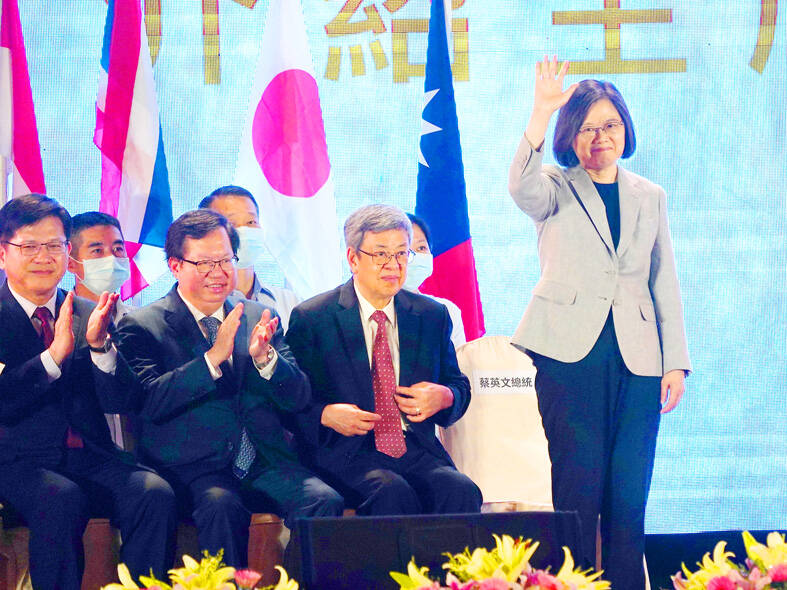Taiwan has to cooperate with other countries in establishing a resilient and secure global supply chain in the face of authoritarian expansion, President Tsai Ing-wen (蔡英文) said at the Asia Taiwanese Chambers of Commerce’s meeting of directors and supervisors yesterday.
Taiwan should “reach out to the world and become a key force in the global economy” as Asia-Pacific is the future economic center of the world, Tsai told the organization comprising of Taiwanese businesspeople based overseas.
Taiwanese industries should grasp development trends in the world and “shine brightly on the global stage,” she said.

Photo: CNA
The government has been actively promoting the New Southbound Policy in the past few years, which has provided some results, she said, citing the record trade volume of US$180.3 billion between Taiwan and New Southbound Policy’s target countries last year.
The government allocated a budget of NT$31.7 billion (US$1.02 billion) for three years to help small and medium-sized enterprises recover from the COVID-19 pandemic and strengthen Taiwan’s economic and social resilience, she said.
It also helped enhance the competitiveness of Taiwanese businesses through net zero carbon emission and digital transition, she said.
The establishment of 11 semiconductor colleges and research institutes in key national fields can help cultivate high-level talents to drive industrial progress and to attract students from all over the world to study in Taiwan, she said.
The government is also planning to launch the Talent Taiwan program, which is a one-stop service center to recruit international talent, she said.
Tsai thanked Taiwanese businesspeople based overseas for promoting diplomacy and their care for Taiwan’s industrial development.
She encouraged them to continue deepening the economic and trade links between Taiwan and Indo-Pacific countries and contributing to regional economic development.
Premier Chen Chien-jen (陳建仁) said that in response to the concerns raised by Taiwanese businesspeople based overseas when they visited Cabinet in April, the government expanded employment incentives and launched industry-academia collaboration programs to help fill shortages in the workforce.
Chen encouraged domestic and overseas Taiwanese businesses to promote the green transition of the industry to tackle the challenges posed by climate change.
He thanked Taiwanese businesspeople based overseas for advocating for Taiwan’s participation in the Comprehensive and Progressive Agreement for Trans-Pacific Partnership, the WHO and the World Health Assembly.
Overseas Community Affairs Council Minister Hsu Chia-ching (徐佳青) said that number of overseas Taiwanese students who returned to Taiwan to study from Indonesia, Vietnam, Myanmar, the Philippines, and Thailand increased this year.
The council is to continue to work with overseas Taiwanese businesspeople to attract, nurture and retain overseas Taiwanese talents, she said.

HORROR STORIES: One victim recounted not realizing they had been stabbed and seeing people bleeding, while another recalled breaking down in tears after fleeing A man on Friday died after he tried to fight the knife-wielding suspect who went on a stabbing spree near two of Taipei’s busiest metro stations, Taipei Mayor Chiang Wan-an (蔣萬安) said. The 57-year-old man, identified by his family name, Yu (余), encountered the suspect at Exit M7 of Taipei Main Station and immediately tried to stop him, but was fatally wounded and later died, Chiang said, calling the incident “heartbreaking.” Yu’s family would receive at least NT$5 million (US$158,584) in compensation through the Taipei Rapid Transit Corp’s (TRTC) insurance coverage, he said after convening an emergency security response meeting yesterday morning. National

Beijing could eventually see a full amphibious invasion of Taiwan as the only "prudent" way to bring about unification, the US Department of Defense said in a newly released annual report to Congress. The Pentagon's "Annual Report to Congress: Military and Security Developments Involving the People's Republic of China 2025," was in many ways similar to last year’s report but reorganized the analysis of the options China has to take over Taiwan. Generally, according to the report, Chinese leaders view the People's Liberation Army's (PLA) capabilities for a Taiwan campaign as improving, but they remain uncertain about its readiness to successfully seize

Taiwan has overtaken South Korea this year in per capita income for the first time in 23 years, IMF data showed. Per capita income is a nation’s GDP divided by the total population, used to compare average wealth levels across countries. Taiwan also beat Japan this year on per capita income, after surpassing it for the first time last year, US magazine Newsweek reported yesterday. Across Asia, Taiwan ranked fourth for per capita income at US$37,827 this year due to sustained economic growth, the report said. In the top three spots were Singapore, Macau and Hong Kong, it said. South

PLANNED: The suspect visited the crime scene before the killings, seeking information on how to access the roof, and had extensively researched a 2014 stabbing incident The suspect in a stabbing attack that killed three people and injured 11 in Taipei on Friday had planned the assault and set fires at other locations earlier in the day, law enforcement officials said yesterday. National Police Agency (NPA) Director-General Chang Jung-hsin (張榮興) said the suspect, a 27-year-old man named Chang Wen (張文), began the attacks at 3:40pm, first setting off smoke bombs on a road, damaging cars and motorbikes. Earlier, Chang Wen set fire to a rental room where he was staying on Gongyuan Road in Zhongzheng District (中正), Chang Jung-hsin said. The suspect later threw smoke grenades near two exits